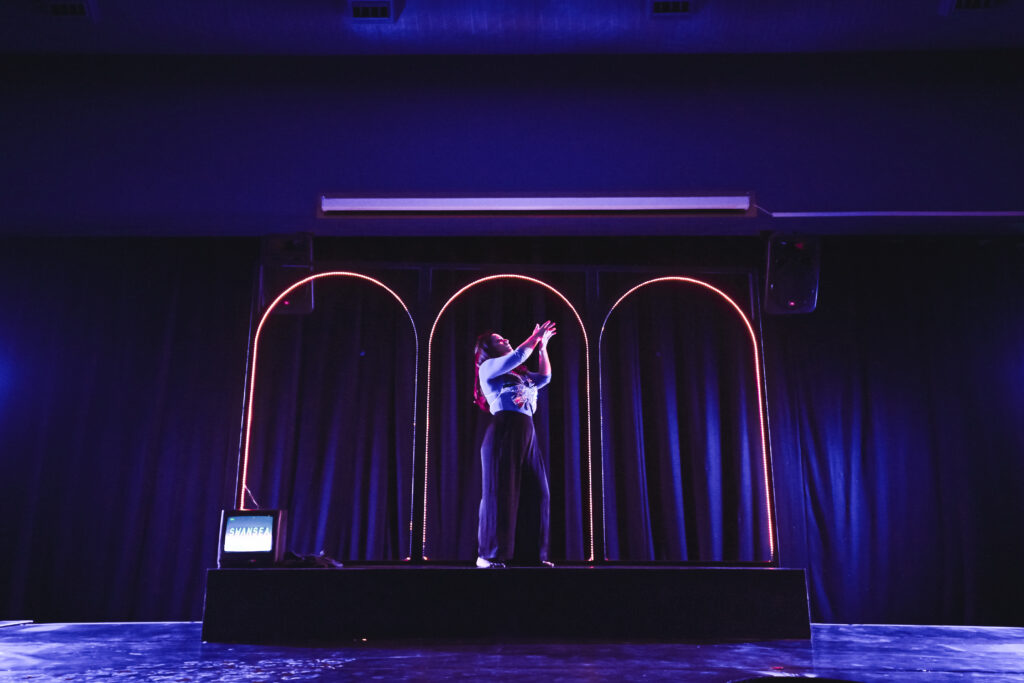Tom Kemp reviews Baba Joon, a one-woman production from Swansea Grand Theatre, showcasing a debut performance from playwright Lisa Zahra.
Performed by Lisa Zahra, and co-produced by The Other Room and Grand Ambition, Baba Joon (Father Dear) tells the story of one man’s journey to Swansea from his homeland, Iran, during the 1970s. After becoming ‘the talk of Clydach’ for falling in love with a Welsh woman, Baba Joon’s family, and most notably his daughter, pave their way as a mixed heritage household living in South Wales in the subsequent years. Baba Joon also marks Zahra’s debut as a playwright. Originally written during lockdown, the script was developed at the Royal Court Writers Programme 2013 and then later commissioned by The Other Room’s 3 Phase Participation Project 2022.
This one-woman show is performed in the intimate Arts Wing of the Swansea Grand Theatre. The relatively small space works well for the play, allowing the audience to feel close to the character as we follow her on her journey of self-discovery. Had the space been any bigger, I fear some twinkles of personal connection between the audience and performer might have been lost.
The fusion between Zahra’s personal, emotional and thought-provoking performance coupled with Izzy Rabey’s brilliant direction evokes themes of belonging, heritage and identity.
Zahra’s infectious energy, quick pace and timing also allow for moments of stillness and calm, resulting in a highly engaging play. Moments of audience laughter, quickly met with complete silence, are common throughout the performance. The fusion between Zahra’s personal, emotional and thought-provoking performance coupled with Izzy Rabey’s brilliant direction evokes themes of belonging, heritage and identity. The play’s exploration of how one can simultaneously feel so at home and so foreign in Swansea, as well as Zahra’s longing to visit her father’s country of Iran, were striking. The play seamlessly fits between English, Farsi and Welsh. The use of the Welsh word “hiraeth” only intensifies this exploration and confusion of identity, whilst belonging to a mixed heritage family. By the end of the play, we are left wondering, perhaps much like the protagonist herself: is it Wales, or Iran she truly yearns for?
Where are we from? Where do we belong? Where’s home?
Whilst Zahra’s performance deserves high praise, I felt that the sections of physical movement, directed by Gemma Prangle, at first failed to enhance the storytelling. It isn’t until midway through the play, when dancing the night away as a youth in a nightclub on Swansea’s Kingsway, that the narrative and emotion of the character’s inner struggles and conflict start coming through more clearly. I wish more of these moments would be woven into the play.
Within seconds, the audience travels from Swansea to the Iranian capital of Tehran. Although largely set in the 90s, Baba Joon’s exploration of racism and xenophobia continues to chime with modern audiences.
The play’s soundtrack is an effective mixtape of 90s dance and traditional Iranian music from sound designers Roshi Nasehi and Emma Daman Thomas. Cara Evans, the director, makes the decision to situate an old relic-styled television at the back of the stage. Her minimalistic approach provides smooth transitions between local backdrops. Within seconds, the audience travels from Swansea to the Iranian capital of Tehran. Although largely set in the 90s, Baba Joon’s exploration of racism and xenophobia continues to chime with modern audiences.
Overall, Baba Joon is a wonderfully important exploration of the result of combining contrasting cultures and heritage from across Europe and Asia, whilst celebrating both.
All articles published on the welsh agenda are subject to IWA’s disclaimer. If you want to support our work tackling Wales’ key challenges, consider becoming a member.





